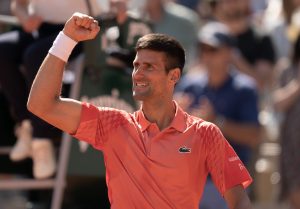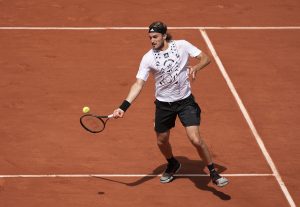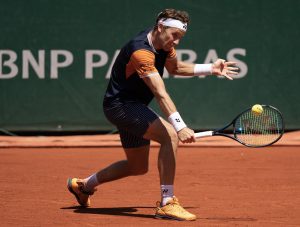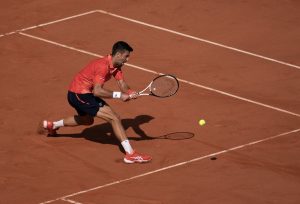Roger Federer will always remain indebted to Robin Soderling. The Swede helped the legendary Swiss add the final piece to his Grand Slam puzzle.
The 2009 edition of the French Open happened to be Federer’s 11th attempt at the title. The Swiss, then 28, already had an impressive haul of 13 Grand Slam titles in his kitty and that included five consecutive triumphs at both Wimbledon (2003-07) and the US Open (2004-08). Roland Garros albeit remained elusive so did the career Slam.
In his prior four appearances in the French capital, the Swiss had lost to the same opponent–Rafael Nadal. Worse still, three of those losses came in the final. While Federer had managed to take a set off the Spaniard in both 2006 and 2007, the 2008 final was a rout, Nadal winning 6-1 6-3 6-0.
It was clear that Federer was finding it increasingly difficult to add the lone Grand Slam trophy missing from his collection. With Nadal, at almost five years younger, around it was certain that the Swiss would struggle to win at Roland Garros.
It is at this juncture that Soderling unwittingly offered him a helping hand. Coming into the 2009 French Open, the Swede had never previously progressed beyond the third round of a Grand Slam. In Paris that year though Soderling made sure his name would remain etched forever in the tournament’s history.
In the Round of 16, Soderling upset four-time defending champion and the resounding favorite Nadal, in the process handing the Spaniard his first-ever defeat at Roland Garros. Three years before, in the opening round of the French Open, Nadal had eased past the Swede in their first-ever meeting. A couple of weeks ahead of 2009 edition of the tournament, it was 6-1 6-0 in favor of the Spaniard in the third round of the Rome Masters.
However, on this occasion, the Swede was undaunted by the stature of his opponent. The fact that he had lost all his three previous meetings to Nadal didn’t matter. On the contrary, he was playing an aggressive brand of tennis that had caught the Spaniard completely off guard. As the match progressed Nadal found Soderling’s game increasingly difficult to handle.
The 6-2 6-7(2) 6-4 7-6(2) verdict in the Swede’s favor wasn’t just one of the biggest upsets in the history of the sport but also made Soderling the first player to beat Nadal in a best of five-set match on clay.
Unlike many other players who cause an upset in one round only to get “upset: themselves in the following round, Soderling proved his career-defining win against Nadal was no fluke, by scoring back-to-back wins over the formidable Nikolay Davydenko, a two-time semifinalist at Roland Garros, and 2007 Australian Open finalist Fernando Gonzalez to make it to the title clash.
It is said that when an opportunity presents itself one should be ready to grab it. It is a shame if a player does all the hard work, only to falter in the final hurdle. This is precisely what happened.
Having put in so much effort leading into the final, Soderling couldn’t get it across the line. It is palpable that the occasion got to him. Playing in his first Major final, and against a celebrated opponent, weighed heavily on the Swede’s mind, and this allowed Federer–playing in his fourth straight final–to seize the glorious opportunity and complete his Grand Slam collection.
A year later Soderling was back in Paris, not as an unheralded journeyman but as a recognized name. He was seeded fifth, his highest ever seeding in a Slam. A pretty straightforward run to the last eight ensured a rematch of the previous year’s final. On this occasion the Swede had his revenge, beating Federer for the first time after a dozen defeats–and for the only time in his career (16 losses). A come-from-behind five-set win over Czech Tomas Berdych in the semifinal meant Soderling was going to have a second successive opportunity to win the French Open.
Standing between him and a maiden Grand Slam title was a known face. Nadal was back in familiar territory and had set records along the way. The Spaniard was expected to dominate the clay-court season, but in 2010 he had possibly surpassed his own expectations by becoming the first player to make a clean sweep of all the three Masters 1000 tournaments on the surface–Monte Carlo, Rome, and Madrid–in the same year. Seeded second, the Spaniard was yet to drop a set en route to the final in Paris.
The impressive form of his opponent notwithstanding Soderling had every reason to believe in his chances. He had followed up his fourth-round upset of the previous year with a straight-sets win over Nadal, in the 2009 ATP World Tour Finals. Besides, his form in 2010 was pretty good. Apart from winning in Rotterdam that year, the Swede had made it to the semifinals at the Masters 1000 tournaments in both Indian Wells and Miami, and was a finalist in Barcelona (on clay).
But as it turned out he was a patch on the player who had upset Nadal the year before. Soderling was again guilty of failing to put up a semblance of a fight when it mattered, the Spaniard winning his fifth French Open title for the loss of just ten games.
In 2009 Soderling could be given the benefit of doubt for the occasion getting to him. The following year there was no such excuse. He had played in a major final. He had beaten the opponent he was facing, on the surface, they were playing. He could have at least put up a fight, made a match of it. Alas, it wasn’t to be. The blame for the result rested solely on the player’s shoulders.
Soderling did well to create opportunities for himself, not once but twice, in successive years at that. Only if the Swede had managed to convert either of them. Even though he returned to Paris in 2011 – losing again to Nadal in straight sets at the last eight stages, Soderling didn’t have much time thereafter. A wrist injury forced him to withdraw from multiple tournaments in the hardcourt swing. Then he was diagnosed with mononucleosis – also known as glandular fever, and this ensured a premature end to his tennis career, at the age of 26.
It’s been more than a decade since, and Soderling remains the last Swede to have played in a Grand Slam final. Had he grabbed either of his two opportunities at Roland Garros he would have become the last Swede to have won a Grand Slam. There lies the difference, between creating chances, and converting them.
Main Photo:
Embed from Getty Images






